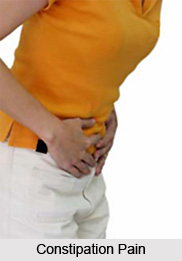 Diet is the most significant factor in the natural cure of constipation. This should consist of unrefined food such as whole grain cereals, honey, molasses, and lentils; green and leafy vegetables, especially spinach, tomatoes, lettuce, onion, cabbage, cauliflower, sprouts, celery, turnip, pumpkin, peas, beets, asparagus and carrot. Fresh fruits, particularly pears, grapes, figs, papayas, mangoes, grapefruit, gooseberries, guava and oranges; dry fruits such as figs, raisins, apricots and dates; milk products in the form of butter, ghee and cream are to be included in the diet.
Diet is the most significant factor in the natural cure of constipation. This should consist of unrefined food such as whole grain cereals, honey, molasses, and lentils; green and leafy vegetables, especially spinach, tomatoes, lettuce, onion, cabbage, cauliflower, sprouts, celery, turnip, pumpkin, peas, beets, asparagus and carrot. Fresh fruits, particularly pears, grapes, figs, papayas, mangoes, grapefruit, gooseberries, guava and oranges; dry fruits such as figs, raisins, apricots and dates; milk products in the form of butter, ghee and cream are to be included in the diet.
The diet alone is not enough. Food should be properly chewed-each morsel for at least fifteen times. Hurried meals and meals at odd times should be avoided. Sugar and sugary foods should be firmly avoided because sugar steals B vitamins from the body, without which the intestines cannot function normally. Regular drinking of water is beneficial not only for constipation but also for cleaning the system, diluting the blood and washing out poisons. Normally six to eight glasses of water should be taken every day as it is necessary for digesting and dissolving food nutrients so that they can be absorbed and utilised by the body. Water should, however, not be taken with meals as it dilutes the gastric juices essential for proper digestion. Water should be taken either half an hour before or an hour after meals.
Generally all fruits, except banana and jack fruit are beneficial in the treatment of constipation. Certain fruits are however, more effective. Bael fruit is regarded as best of all laxatives. It cleans and tones up the intestines. Its normal use for two or three months throws out even the old accumulated faucal matter. Though generally used to check diarrhoea, bael contains both laxative and constipative properties. It hardens the stools when they are loose and serves as a laxative when the bowels are constipated. Pears are regarded the next best fruit useful in the treatment of constipation. Patients suffering from chronic constipation should better adopt an exclusive diet of this fruit or its juice for few days, but in normal cases a medium-sized pear taken after dinner or with breakfast will have the desired result. The same is true of guava which, when eaten with seeds, gives roughage to the diet and helps in the normal evacuation of the bowels.
 Grapes have also proved extremely beneficial in overcoming constipation. The combination of the properties of the cellulose, sugar and organic acid in grapes make them a laxative food. Their field of action is not limited to clearing the bowels only. They also tone up the stomach and intestines and relieve the most chronic constipation. One should take at least 350 grams of grapes daily to achieve the desired results. When fresh grapes are not available, raisins soaked in water can be used. Raisins should be soaked in drinking water for 24 to 48 hours. This would swell them to the original size of the grapes. The raisins should be eaten early in the morning. The water in which raisins are soaked should be drunk along with the soaked raisins.
Grapes have also proved extremely beneficial in overcoming constipation. The combination of the properties of the cellulose, sugar and organic acid in grapes make them a laxative food. Their field of action is not limited to clearing the bowels only. They also tone up the stomach and intestines and relieve the most chronic constipation. One should take at least 350 grams of grapes daily to achieve the desired results. When fresh grapes are not available, raisins soaked in water can be used. Raisins should be soaked in drinking water for 24 to 48 hours. This would swell them to the original size of the grapes. The raisins should be eaten early in the morning. The water in which raisins are soaked should be drunk along with the soaked raisins.
Drinking hot water with sour lime juice and half a teaspoon of salt is also an effective remedy for constipation. Linseed is very useful in difficult cases of constipation. A teaspoon of linseed swallowed with water before each meal provides both bulk and lubrication. In all ordinary cases of constipation, an exclusive fruit diet for about seven days would be the best way to begin the treatment. Weak patients may take orange juice during the period of fasting. After the all-fruit diet or the short fast, as the case may be, the patient should gradually embark upon a balanced diet comprising adequate raw foods, ripe fruits and whole grain cereals. It some cases, further short periods on fruits or short fasts may be essential at intervals of two months or so, depending on the improvement being made. The bowels should be cleansed daily through a warm water enema for a few days at the commencement of the treatment.
A cold friction bath taken daily in the morning can help cure constipation. An alternate hot and cold hit bath taken before retiring to bed is also beneficial. Abdominal exercise and manual or mechanical vibratory massage have a refreshing and stimulating effect in many cases. Toning up the muscles also helps in the treatment of constipation. Fresh air, outdoor games, walking, swimming, gardening and exercise play an important role in strengthening and activating the muscles, thereby preventing constipation. Yoga for constipation brings relief as they strengthen the abdominal and pelvic muscles and stimulate the peristalic action of the bowels. These asanas are: bhujansana, salabhasana, yogamudra, dhanurasana, halasana, paschimottanasana. Pranayamas, such as, anuloma-viloma and bhastrika and jalaneti kriyas are also helpful.




